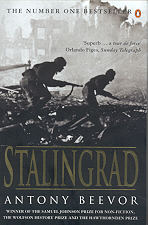
Stalingrad
Antony Beevor
494 pages, including index
published in 1998
Stalingrad was the first major defeat of the Wehrmacht, the moment from which Germany would largely fight a defensive rather than an offensive war. Sure there would be large offensives after Stalingrad, but the initative would from then on lie with the Soviets. Though it is somewhat of an exaggeration to say that the battle of Stalingrad determined the outcome of World War II, it is not that much of an exaggeration. It is no wonder that so many people are fascinated by it. It appeals to our sense of the epic, a titanic struggle between two of the largest armies ever seen, a very Wagnerian struggle.
Such a subject deserves a good book devoted to it and Antony Beevor's Stalingrad does not disappoint. In his preface Beevor states that to approach the story of Stalingrad as a purely military study is to miss the reality of it. Instead, Beevor wants to show the experiences of the soldiers fighting on both sides, but within, as he calls it, "the framework of a conventional historical narrative". I found this approach to work quite well, as you got both a clear understanding of how the battle for Stalingrad developed and what it was like to actually live through it (in as much as it is possible to understand something by reading about it). In this approach it reminded me of Christopher Duffy's Red Storm on the Reich.
Beevor's task was made easier by the opening up of Soviet archives in the nineties. Until the end of the Cold War, much if not all of what was available in Soviet state archives was unavailable to western researchers and historians, especially politically and historically sensitive material. The opening up of this material has been an immeasurable boon to historians, clearing up old mysteries as well as clearing away a lot of misconceptions. In Beevor's case, this means he could use uncensored Soviet accounts of the battle of Stalingrad --battle reports, NKVD's accounts, letters home from ordinary soldiers and did not have to rely on secondary sources and official histories.
Stalingrad is divided into five parts. In the first part of the book, Beevor sets the context for the battle, by describing the German invasion of the Soviet Union up to the point of the delayed battle for Moscow. In part two, attention shifts to the Southern Ukraine and Von Paulus is introduced, before he became the commander of the ill-fated Sixth Army. Part two ends with the German army on the doorsteps of Stalingrad.
Part three describes the German offensive on Stalingrad and the house to house fighting in the city, which was absolutely brutal. Throughout the book, Beevor has made it clear that the Wehrmacht was culpible of warcrimes from the start, capable of great brutality as well as great heroism. Though at times the Russians are little better in their treatment both of prisoners of war as well as their own soldiers, not hesitating to shoot large numbers of their own men pour encourager les autres, it is clear that the Germans are much worse. Even before the food shortage in stalingrad became acute for the Germans, they let their Russian prisoners starve to the point of cannibalism.
And yet, at the same time, there were quite a few Russians and Ukrainians fighting with the Germans, prefering the nazis to the communists. Their number shocked even the NKVD, professional cynics about the patriotism and loyalty of the ordinary Soviet citizen.
In part four, the counteroffensive by Zhukov is discussed. Instead of a frontal assault on the German Sixth Army, Zhukov was smart enough to pincher the Germans, by attacking the weak Romanian and Italian divisions located on both sides of the Sixth Army, thus cutting them off and encircling them. Beevor makes it clear that the only chance von Paulus had to break this threat had been just before and during the offensive; it was already too late when the Russian pinchers met.
The final part of the book describes the long, drawnout death of the Sixth Army and the attempts to rescue it. Again, it does not make for nice reading. There is no glory, no glamour to be found here. Beevor doesn't stop at the surrender of Von Paulus, but also follows the Germans into captivity, showing what happened to them for the rest of the war and beyond, as well as the impact of Stalingrad on Germany and the Allies.
It is clear to see why Stalingrad was both such a critical as a commercial success. Beevor has a very accessible style of writing and a good sense of what is important and what isn't, with an eye for detail. He manages to both show the epic, titanic nature of the struggle and the consequences of it for the common German and Russian soldier. If you read only one book about Stalingrad, make it this one.
